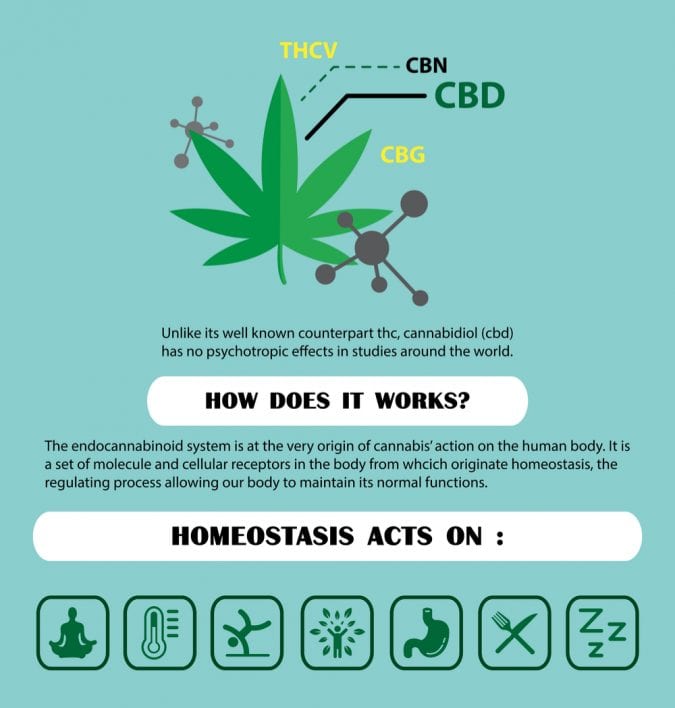
An essential nutrient is a compound that the body needs, but can’t manufacture on its own.
The more we learn about cannabis, the more the nuances of its therapeutic uses become apparent. There are those who take cannabis to treat acute medical conditions and those who take it to prevent daily and chronic medical conditions. Not to mention the many, many companies selling CBD as a nutritional supplement. When you get into the nitty-gritty details about what cannabis actually is and isn’t, it can become confusing. However, it’s becoming clearer that cannabis could provide essential nutrients.
As this ancient medicinal plant becomes increasingly available, more folks are wondering if they should start taking it every day, like a vitamin. After all, it has many proven therapeutic benefits, and at least some of the compounds (CBD, for instance) have a proven safety profile. So why not start a daily supplement regime with a little cannabis?
Phytocannabinoids in the Endocannabinoid System
The endocannabinoid system (ECS) is a relatively new discovery (1992). The ECS is a system of cannabinoid receptors that turn on and off in response to a variety of internally produced chemicals, called endocannabinoids. These chemicals manage stress, pain, appetite, mood, and a myriad of other crucial systems to achieve an internal balance.
Interestingly, the endocannabinoid system doesn’t just respond to endogenous cannabinoids. As it turns out, it also responds to compounds in cannabis called phytocannabinoids, or cannabinoids for short. These compounds, such as THC, CBD, and CBN, also activate these receptors. It’s why cannabis has an impact on so many medical issues.

Not an Essential Nutrient, But It’s a Beneficial One
You cannot live a full and happy life without naturally produced endocannabinoids to send internal communications through your body. On the other hand, you can live a full and happy life without any supplemental phytocannabinoids. While cannabis may help regulate an out-of-balance system, it’s not essential to human health. Because of this crucial point, cannabis is not an essential nutrient like vitamins, minerals, and fatty acids.
But, when your system goes haywire, cannabinoids do have the ability to bring it back to homeostasis.
Researchers still don’t fully understand long-term cannabis consumption. If you take a dose of medical cannabis on a daily basis, what are the long-term risks compared to its benefits?
Another important consideration is which cannabinoids you’re taking. There could be major differences between the long-term effects of CBD compared to THC.
To better cover this point, let’s look at THC and CBD separately.
THC: Effects and Benefits
The most popular cannabinoid is THC. To date, it’s the only cannabinoid known to have measurable intoxicating effects. Which means it’s the only one responsible for the elevated feeling. It’s undergoing a massive wave of scientific study, exploring its therapeutic potential to treat pain, cancer, mood disorders, and inflammatory diseases like IBS and autoimmune disorders, just to name a few.
If you are taking THC medicinally, there are two ways to approach it. One is for acute targeted relief, and one helps long-term chronic issues, like pain and inflammation. Both approaches are largely seen as therapeutic, but some folks may consider daily THC consumption as more akin to a daily supplement.
Yet, taking a dose of THC-rich cannabis every day is much different from taking a daily supplement. Daily consumption is usually best for the treatment of specific health concerns. Plus, THC does come with some health risks. You should, therefore, approach it like any other therapy – cautiously, and with a physician’s expertise on dosage.
CBD As a Daily Supplement
Cannabidiol is THC’s gentler cousin that doesn’t trigger any intoxication. Because of its proven safety profile, it’s more medically applicable, even for children. It’s easy to see how people conflate this compound with an essential nutrient. It’s like taking a vitamin C supplement – over time the benefits begin to manifest, but in the short-term, it’s hard to see the results.

Regardless, CBD is not an essential nutrient. Without CBD, the human body can still survive, and even thrive. Cannabidiol, when properly prescribed and managed, targets specific symptoms. It helps the body work better, but the body won’t fall apart if this compound is not available.
Importantly, the long-term daily supplementation of any cannabinoid may alter how our endocannabinoid system works. Some experts theorize that our receptors may become overly sensitive, or desensitized. In essence, long-term cannabinoid exposure can affect the way your cannabinoid receptors activate or deactivate. These receptors may become hyperactive, or under-active.
It’s why some people who consume cannabis on a daily basis for chronic health issues tend to take a day off every so often. This allows their receptors to reset. Always speak to a healthcare professional before starting any new daily supplement. They will assess your health issue, your history, and your current prescriptions to predict the results. Cannabis is hugely beneficial, but not appropriate for everyone. There are, for example, some contraindications with other medicines
Thank you readers for your interest in the article. Please like and comment so we have more motivation to write articles
0 Comment:
Post a Comment